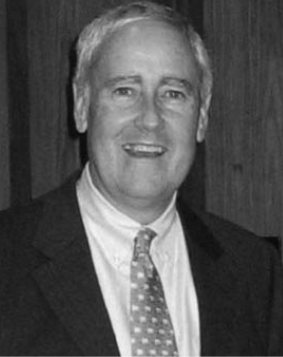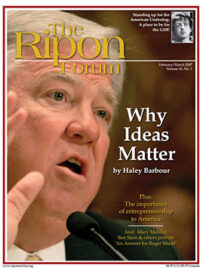
Tom Frank generated a big buzz – at least here in Kansas – with his book What’s the Matter with Kansas? Told from a distinctly liberal ideological perspective, the book rips us crazy right wingers but misses the bigger issue: What’s the matter with Washington?
Let’s face it; we Republicans got our heads handed to us in the last elections. After many of us had toiled for years to get a Republican majority in Congress, we proceeded to lose it in just twelve years. Prior to 1995, the Democrats had controlled Congress, or at least one house, for forty years.
It took us only twelve years to lose it. But that’s not the entire story because both parties are equally to blame for the failures of Washington. So, from a broad perspective, what exactly is wrong with Washington?
One day a conservative legislator commended me on the job I was doing at the Robert J. Dole Institute of Politics at the University of Kansas, a bipartisan institution. But she astounded me when she complained that we hadn’t featured enough conservatives. I pointed out the many that had been to the Dole Institute, including a number of Reagan and Bush (41) leaders. Her response: “I wasn’t involved in politics then… why would I care about them?”
The fact of the matter is that a great number of politicians on both sides of the aisle have either forgotten history or simply never learned it. They don’t understand leadership. That’s a troubling notion because it means that many of the things that made us great as a country have been cast aside for partisan rancor in recent years.
Using two Republican icons – Ronald Reagan and Bob Dole – as guides, let’s look at why I believe our politics is broken. I would like to address four specific areas:
- The pervasive lack of respect and civility in Congress. Washington isn’t unique in this respect, but the folks in Washington are supposed to be our leaders. It’s important to hold to one’s principles but why does that mean you must dislike someone of different views? The bitterness and divisiveness that sets the tone for national politics reflects our popular culture that has grown increasingly coarse, profane and violent, but that doesn’t excuse our leaders for the constant partisan invective.
Reagan and Dole made it a point to get along with everyone, regardless of party affiliation or ideology. President Reagan was known to fight Speaker Tip O’Neill during the day and enjoy a pint with him at night. I never heard the President speak ill of another. Senator Dole practiced civility on a continuous basis, not only with his colleagues but with everyone he came into contact with, from Capitol elevator operators to members of the cabinet.We seem to have lost sight of the notion that we can respect an individual and yet still disagree with them. - Character doesn’t supplant ideology, but neither is the inverse necessarily true. As a conservative college student in 1972, I didn’t care for George McGovern. But later I read about all the missions he flew in World War II and got to know him a bit, and now I respect him immensely. We still disagree on most issues. The point is that both Reagan and Dole would agree with the premise that any time you assess an individual you can’t ignore their character. One of the problems in Washington is that if you don’t match up correctly from a philosophical perspective, you aren’t right. No matter how exemplary their character, those out of tune philosophically are wrong. The inverse seems to hold as well: If you agree philosophically, character is irrelevant.Again, look to Reagan and Dole. They put their philosophy ahead of character, but always considered the latter.
- Compromise is not inherently evil. This view is rejected by many from both parties. Politics has turned into a zero sum game where it’s all or nothing. Now, while accepting the notion that compromise is viable on some issues without betraying one’s philosophy, it’s not true on all the problems we face as a nation. I am not suggesting that our leaders abandon their philosophical anchors for the sake of the deal. That doesn’t recognize the unique nature of many of the problems we face.But contemplate this point: If the Founding Fathers had refused compromise as a point of principle, we would still be paying taxes to the King.Reagan used to always say that he’d rather have 80% of something than nothing. Bob Dole was a master of compromise. Like, Reagan, he sought to achieve his big goals while being less concerned about giving ground on the small ones; the point being compromise isn’t good or bad – it’s simply people of different viewpoints realistically understanding the way politics works.
- Politics should always be a clash of vastly different ideals. Our leaders can respect each other, recognize that colleagues of marginal character are not rendered pure by their philosophy and be open, on some issues, to the concept of compromise; yet the two parties have a responsibility to present different points of view to the American people.
The fact of the matter is that a great number of politicians on both sides of the aisle have either forgotten history or simply never learned it.
The goal of politics isn’t to devise a way to go down the center on everything; it is to offer the voters two opposing philosophies to choose from. Both parties have moved away from this premise. Democrats have backed away from their traditional beliefs for fear of being labeled “liberal.” Republicans have over the last few years actually embraced big government. Isn’t “big government conservatism” an oxymoron? The voters said just that last November and punished us for getting away from our core values.
Reagan and Dole both saw the philosophies of the parties as profoundly different. In many ways, that governed their world views. Reagan spoke constantly about a political banner of bold colors, not pale pastels.
We live in a vastly different time than when President Reagan and Majority Leader Dole represented these ideals. Some may think me naïve for believing we can get back to them. But if we can’t, how can we fix Washington?
Both parties are on the wrong track and have lost sight of the true nature of our governing system as defined by the Founders. It’s our responsibility as Republicans to recognize this and work to fix it. There are good people on both sides – albeit with dramatically different views. It’s time for our leaders to incrementally move in this direction as a style of governance, and hopefully soon.
Before it is too late. RF
William B. Lacy is the Director of the Robert J. Dole Institute of Politics at the University of Kansas. Previously, he served as the political director at the Republican National Committee, and as a strategist on Senator Dole’s 1988 and 1996 presidential campaigns.




